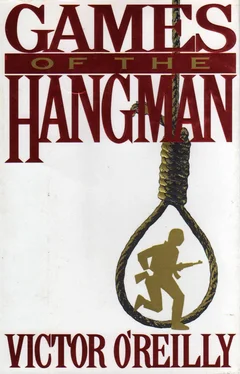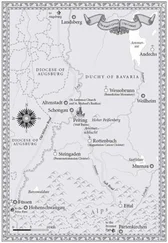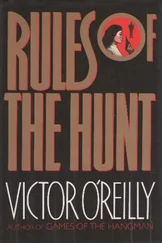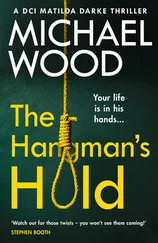Victor O'Reilly - Games of The Hangman
Здесь есть возможность читать онлайн «Victor O'Reilly - Games of The Hangman» весь текст электронной книги совершенно бесплатно (целиком полную версию без сокращений). В некоторых случаях можно слушать аудио, скачать через торрент в формате fb2 и присутствует краткое содержание. Жанр: Триллер, на английском языке. Описание произведения, (предисловие) а так же отзывы посетителей доступны на портале библиотеки ЛибКат.
- Название:Games of The Hangman
- Автор:
- Жанр:
- Год:неизвестен
- ISBN:нет данных
- Рейтинг книги:4 / 5. Голосов: 1
-
Избранное:Добавить в избранное
- Отзывы:
-
Ваша оценка:
- 80
- 1
- 2
- 3
- 4
- 5
Games of The Hangman: краткое содержание, описание и аннотация
Предлагаем к чтению аннотацию, описание, краткое содержание или предисловие (зависит от того, что написал сам автор книги «Games of The Hangman»). Если вы не нашли необходимую информацию о книге — напишите в комментариях, мы постараемся отыскать её.
Games of The Hangman — читать онлайн бесплатно полную книгу (весь текст) целиком
Ниже представлен текст книги, разбитый по страницам. Система сохранения места последней прочитанной страницы, позволяет с удобством читать онлайн бесплатно книгу «Games of The Hangman», без необходимости каждый раз заново искать на чём Вы остановились. Поставьте закладку, и сможете в любой момент перейти на страницу, на которой закончили чтение.
Интервал:
Закладка:
De Guevain ran to the concealed door that led to the tunnel and swung it open. Andreas and the Bear grabbed what extra weapons and ammunition they could and, with a last glance at Harry Noble's body, ran for safety. De Guevain followed, pulling the massive door behind him and ramming home the series of bolts and securing bars. They had bought some time at the cost of yet another life – but the Hangman's forces were now inside the castle.
Above Fitzduane's Castle – 2351 hours
The Sabine had moved to within five hundred meters of the shore and then had opened fire on the keep with a pair of heavy machine guns. Murrough had been swept off the dugout roof by this concentration of fire from an unexpected quarter, and his body now lay outside the castle walls.
Circling high above the battlefield, his ammunition low, Kilmara had expended the last of his ordnance on this new threat. In two low-level attacks he had put the heavy machine guns out of action and holed the ship below the waterline. The cattle boat, essentially a series of open ramp-linked decks with the engine and crew quarters at the stern, had no bulkheads, and seawater had rushed in through the holes. The Sabine was sinking.
The few surviving crew had headed toward land in an inflatable. With the Optica's external weaponry out of ammunition, Kilmara instructed the pilot to fly low. He killed the remaining three survivors with his automatic rifle, using the Kite night sight and shooting through a firing port in the door.
The SAM-7 missile was out of commission, and there was no sign that the terrorists had brought more than one unit, so the Optica was now operating as it had been built to – as a combined observation aircraft and command post. Kilmara's eyes were fixed mainly on the IR viewer screen, with intermittent glances at the flames and tracers and other graphic signs of the intense combat below. Keeping above the effective range of the surviving land-based heavy machine guns, the Optica circled the combat zone, monitoring developments, providing precise enemy position locations for the advancing Rangers, and keeping in touch with Fitzduane, Dublin, and the remaining Ranger transport, which was still circling, ready to drop its force as soon as the heavy machine guns were silenced.
As commander, Kilmara found that the hardest part of any combat situation was the necessity of remaining aloof from the main action while his men fought and, all too often, died. He had a near-overwhelming desire to parachute from his transparent bubble in the sky, but he kept it suppressed and concentrated on what the modern military termed ‘C3I’: command, control, communications, and intelligence. Or, as he had once termed it: "Fucking around with a fiddle while Rome burns."
If only the Rangers on the ground could clear the heavy machine guns out of the way, then he could bring the balance of his force into action. "If only" – a pretty useless phrase in the real world.
Kilmara pressed the radio transmit button to call the Rangers on the ground but after a moment released it without speaking. His men knew full well what to do.
Ironically, considering the arrival of the Rangers on the island and the recent news that regular army reinforcements were at last on the way – although they would not arrive for several hours – the situation on the ground had never looked worse. The terrorists were now inside the castle. They had taken the gatehouse and occupied the outhouses and battlements of the bawn. Fitzduane had just made the decision to abandon the great hall and consolidate in the keep and the tunnel below. He hadn't much choice, since the terrorists occupied the floors below the great hall.
Fitzduane's original force had been whittled down to seven effectives, including the two middle-aged women who were primarily non-combatants. Several of the seven were wounded, lightly in most cases but with the inevitable toll on energy and stamina. Henssen had lost the use of one arm. Ammunition, given the intensity of the combat, was running low. The grenades and other specialized weaponry had been largely expended.
With great reluctance, Fitzduane deployed the ten student volunteers. At the rate things were going, he'd soon be down to a bunch of teenagers and medieval weaponry.
29
Fitzduane's Castle – 0004 hours
Kadar's mood had oscillated from one extreme to the other during the last few hours. Now, despite the initial setbacks, he felt euphoric. Victory was imminent, and it was all the sweeter for being the harder won.
He looked around the great hall. The room was impressive, the quality of the woodwork outstanding. How many generations of Fitzduanes had talked and eaten and planned in this very room? What blood had been shed here? What compromises and betrayals had been required for the Fitzduanes to have survived Ireland's turbulent history?
He sat in the padded carved oak chair at the head of the table and rubbed his fingers on its massive, timeworn oaken mass. He could feel the slight undulations that represented the original adz marks. My God, he thought, this banqueting table must have been made before Christopher Colombus sailed for America, before Leonardo da Vinci painted the Mona Lisa, before Louis XIV built Versailles.
"Sir?" said Sabri Sartawi, the commander of the Icarus Unit and now the only one of Kadar's senior officers still alive. Kadar was sitting at the head of the table, his eyes closed, his fingers caressing the beeswax-polished wood. There was a smile on his face. Desultory gunfire could be heard around the keep, and from time to time the dull whump of a Molotov cocktail. It was a hell of a time to daydream, but nothing Kadar did surprised Sartawi anymore. The man was obviously insane; still, his insanity was mixed with brilliance. It now looked as if despite everything, they were going to pull it off.
"Sir?" repeated Sartawi more forcefully, and Kadar's eyes snapped open. For a moment Sartawi thought he had gone too far. The eyes blazed with anger.
The moment passed. "Yes?" said Kadar mildly. His fingers were still feeling the patina of the table.
"Situation report, sir," said Sartawi.
"Proceed."
"We've broken through the concealed door in the gatehouse winding room," said Sartawi. "It leads down a circular staircase into a tunnel. We estimate that the tunnel links up with the base of the keep, but we can't be sure because our way is blocked by a heavy steel door."
"Blow it."
"We can't," said Sartawi. "We used up the last of our explosives in the car bomb. We're out of grenades and RPG-7 projectiles, too. We never expected to have to fight this kind of battle. Also, we're very low on ammunition, perhaps one or two magazines per man."
"Are the Powerchute and the LPO-50 ready?" said Kadar. The Powerchute in question was the one that had been flown by that unlucky follower of Hasane Sabah, the Iranian Husain. Although Husain had lost interest in this world after his encounter with the firepower of Fitzduane's SA-80, his dead body had balanced the motorized parachute in such a way that it had made quite a respectable landing on its own -not far from the takeoff point. Kadar had had it moved so that it could take off again out of sight of the defenders in the keep.
"Both are ready," said Sartawi. "And the heavy-machine-gun crews have been briefed."
Kadar was silent for a moment, lost in thought. He pushed back his chair, stood up, and paced up and down the room. He turned to Sartawi. "We have metal-cutting equipment," he said, "the stuff we used to make that armored tractor. Use that on the tunnel door. I'll lay odds that our hostages are on the other side. I want the door open at the same time as the Powerchute attack. Also, I want all this" – he gestured around the great hall – "set fire to. We'll burn the bastards out."
Читать дальшеИнтервал:
Закладка:
Похожие книги на «Games of The Hangman»
Представляем Вашему вниманию похожие книги на «Games of The Hangman» списком для выбора. Мы отобрали схожую по названию и смыслу литературу в надежде предоставить читателям больше вариантов отыскать новые, интересные, ещё непрочитанные произведения.
Обсуждение, отзывы о книге «Games of The Hangman» и просто собственные мнения читателей. Оставьте ваши комментарии, напишите, что Вы думаете о произведении, его смысле или главных героях. Укажите что конкретно понравилось, а что нет, и почему Вы так считаете.











